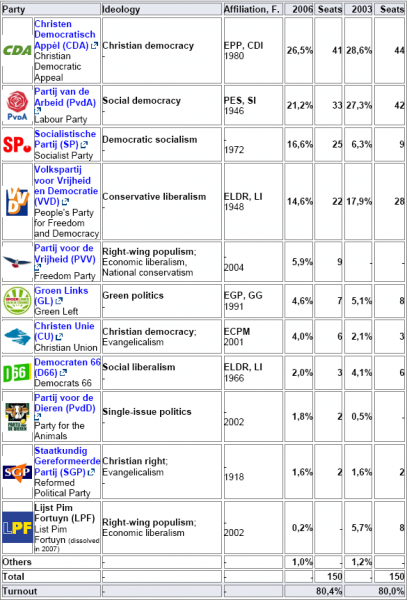The politics of the Netherlands take place within the framework of a parliamentary representative democracy, a constitutional monarchy and a decentralised unitary state. The Netherlands is described as a consociational state. Dutch politics and governance are characterised by a common strife for broad consensus on important issues, within both the political community and society as a whole.
Major political institutions are the monarchy, the cabinet, the States General (parliament) and the judicial system. There are three other High Colleges of state, which stand on equal footing with parliament but have a less political role, of which the Council of State is the most important. Other levels of government are the municipalities, the waterboards and the provinces. Although not mentioned in the constitution, political parties and the social partners organised in the Social Economic Council are important political institutions as well.
It is important to realise that the Netherlands does not have a traditional separation of powers: accordingly the States-General and the government (the Queen and cabinet) share the legislative power. All legislation has to pass through the Raad van State, and the Social-Economic Council advises the government on most social-economic legislation. The executive power is reserved for government. Note however that the Social-Economic Council has the special right to make and enforce legislation on several sectors, mostly in agriculture. The judicial power is divided into two separate systems of courts. For criminal law the independent Hoge Raad is the highest court. For administrative law the Raad van State is the highest court, which is ex officio chaired by the Queen.
The Netherlands has an international outlook; among other affiliations the country is a founding member of the European Union (EU), NATO, the OECD, and has signed the Kyoto protocol. Along with Belgium and Luxembourg, the Netherlands is one of three member nations of the Benelux economic union. The country is host to five international(ised) courts: the Permanent Court of Arbitration, the International Court of Justice, the International Criminal Tribunal for the Former Yugoslavia, the International Criminal Court and the Special Tribunal for Lebanon. All of these courts (except the Special Tribunal for Lebanon), as well as the EU’s criminal intelligence agency (Europol), are situated in The Hague, which has led to the city being referred to as "the world’s legal capital".
Head of State: Beatrix van Oranje Nassau - Queen, Head of Government: Jan Peter Balkenende (CDA) - Prime Minister, Governing Parties: CDA, PvdA, CU
Last national elections 2006

http://www.parties-and-elections.de/netherlands.html
Last European Parliament election June 2009 See: • http://en.wikipedia.org/wiki/European_Parliament_election,_2009_(Netherlands) • http://www.europarl.europa.eu/parliament/archive/elections2009/en/netherlands_en.html
